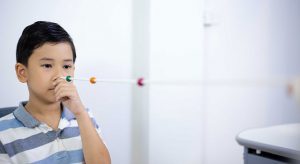Could vision therapy lead to improved self-esteem?
Many children do not receive a comprehensive examination of their visual skills.
As a result, children with reduced visual skills often go undiagnosed— prompting years of academic struggle. Vision problems can also affect athletic abilities and consequently lead to reduced confidence on the sports field. Often, these children are mislabeled as ‘lazy’ or ‘clumsy’.
A child with reduced visual skills can be misdiagnosed with dyslexia or ADHD.
Negative stigmas and misdiagnoses can have a substantial impact on a child’s self-esteem, both in the present and the future.
Fortunately, visual skills can be learned and retrained with vision therapy, especially during the school years, when the brain is still developing.
Does my child need vision therapy?
The following vision conditions can be effectively treated with vision therapy:
- Lazy eye (Amblyopia)
- Eye turns (Strabismus)
- Reading below grade level
- Spelling difficulties
- Poor attention or concentration
- Dislikes doing homework
- Not performing to potential at school
If your child is showing signs of a vision problem, schedule an appointment with an eye doctor near you.
SEE RELATED: Does My Child Have Dyslexia?
At what age can you start vision therapy?
Children as young as 3-4 years old can begin vision therapy.
Vision therapy is a personalized program that aims to improve the visual skills by strengthening the communication between the eyes and the brain.
To help enhance the eye-brain connection, a vision therapy program may include specialized lenses, prisms and eye exercises.
Can vision therapy improve self-esteem?
Children who are having academic or athletic difficulties due to reduced visual skills tend to feel frustrated when it comes to learning. This often impacts their self esteem and confidence— and in some cases, can lead to behavioral and social issues.
Vision therapy can bring back your child’s smile.
As children begin to succeed, and homework and studying become easier, their level of frustration decreases. Vision therapy can improve a child’s visual abilities and help them to achieve their academic goals.
Vision therapy can also play an important role when it comes to preparing for higher education, as accomplishments can lead to a greater belief in one’s own talents and abilities.
This newfound self-assurance will undoubtedly spill over into other areas, improving self esteem for an enhanced quality of life.
If your child is showing signs of a vision problem, schedule an appointment with an eye doctor near you.
LEARN MORE: Vision For School
Don’t let your child’s visual skills prevent them from achieving their goals, vision therapy can unlock your child’s hidden potential and improve their self-esteem.









